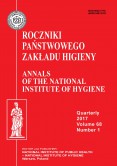Rocz Panstw Zakl Hig 2013, 64(1): 19-24
Effect of resistant starch RS4 added to the high-fat diets on the selected biochemical parameters in Wistar rats
[Effect of resistant starch RS4 added to the high-fat diets on the selected biochemical parameters in Wistar rats]
ABSTRACT
Background. Resistant starch (RS) is part of potato starch that is not digested in the gastrointestinal tract. RS4 is a chemically modified starch (for example by oxidation and esterification) and physically (by heating).
Objective. The study was aimed at determining the effect of resistant starch on lipid metabolism and activity of hepatic enzymes in Wistar strain rats fed high-fat diets containing 15% of lard or 15% of soybean oil.
Material and methods. Four types of diets were administered to the animals (4 groups of males, n=32): control diet (K1) containing 15% of soybean oil; control diet (K2) containing 15% of lard as well as two groups receiving the same diets with 10% addition of resistant starch RS4 (K1S and K2S).
Results. The mean concentration of total cholesterol was lower in the group of animals fed a diet with vegetable oil (39.9 mg/dl) as compared to that reported in the group of rats fed the lard-supplemented diet (55.2 mg/dl). Compared to the control groups in both groups of animals receiving the diet supplemented with resistant starch RS4 the total cholesterol concentration in serum decreased by ca. 25% (differences were statistically significant). In groups of rats receiving oil- or lard-containing diets with the addition of the resistant starch preparation the concentration of triglycerides in serum decreased by ca. 47% and 10%, respectively.
Conclusions. A beneficial effect of the resistant starch RS4 added to Wistar rats diets on the lipid metabolism has been shown. The concentrations of total cholesterol and triglycerides in the serum were lower and concentration of HDL-cholesterol was higher in the rats fed with the diets containing the addition of the RS4 preparation as compared to the control groups. Based on the activity of hepatic enzymes the degree of liver damage was lower in groups of rats fed with diets containing resistant starch RS4 as compared to the control groups.
STRESZCZENIE
Wprowadzenie. Skrobia oporna (resistant starch, RS) jest to część skrobi ziemniaczanej, która w przewodzie pokarmowym nie ulega strawieniu. Skrobia oporna RS4 to skrobia modyfikowana chemicznie (np. przez oksydację lub estryfikację) oraz fizycznie (przez działanie termiczne).
Cel. Celem badań była ocena wpływu skrobi opornej RS4 na gospodarkę lipidową oraz aktywność enzymów wątrobowych szczurów rasy Wistar karmionych dietami wysokotłuszczowymi zawierającymi 15% smalcu lub 15% oleju sojowego.
Materiał i metoda. Zwierzęta (4 grupy samców n=32) karmiono 4 rodzajami diet: kontrolną (K1) zawierającą 15% oleju sojowego i kontrolną (K2) zawierającą 15% smalcu oraz odpowiednio 2 grupy takich samych diet z 10% dodatkiem skrobi opornej RS4 (K1S i K2S).
Wyniki. Średnie stężenie cholesterolu całkowitego w grupie zwierząt karmionych paszą z tłuszczem roślinnym było niższe (39,9 mg/dl) w porównaniu do odnotowanego w grupie szczurów karmionych dietą ze smalcem (55,2 mg/dl). W porównaniu do grup kontrolnych, w obu grupach zwierząt karmionych paszą zawierającą olej lub smalec z dodatkiem skrobi RS4 stężenie cholesterolu całkowitego w surowicy krwi obniżyło się o około 25% (różnice były istotne statystycznie). W grupach szczurów karmionych paszą z dodatkiem preparatu skrobi opornej RS4 stężenie triglicerydów w surowicy krwi obniżyło się odpowiednio o około 47% i 10%.
Wnioski. Wykazano korzystny wpływ skrobi opornej RS4 dodawanej do diet szczurów Wistar na ich gospodarkę lipidową. Stwierdzono zmniejszenie stężenia cholesterolu całkowitego, TGC oraz zwiększenie stężenia cholesterolu HDL w surowicy krwi zwierząt otrzymujących diety z dodatkiem skrobi opornej RS4 w porównaniu do grup kontrolnych. Na podstawie aktywności enzymów wątrobowych stwierdzono niższy stopień uszkodzenia wątroby w grupach szczurów karmionych dietami z dodatkiem skrobi opornej RS4 w porównaniu do grup kontrolnych.
Liczba pobrań: 2733


